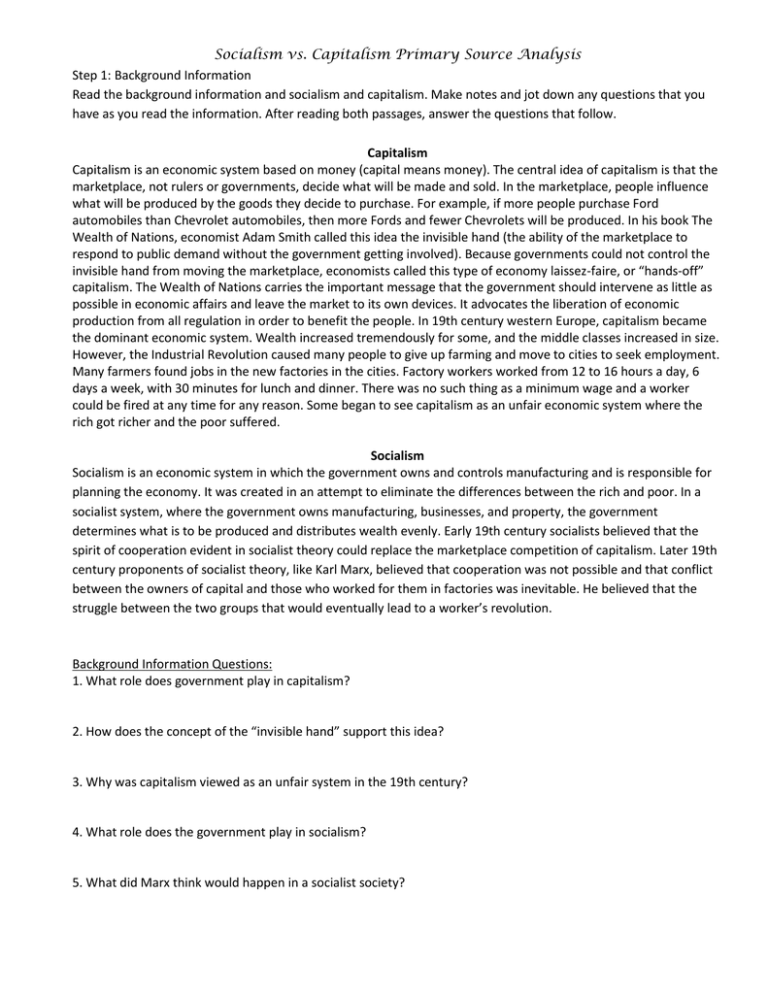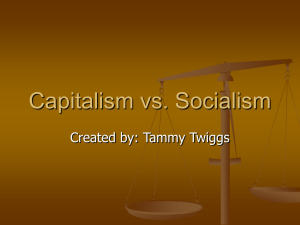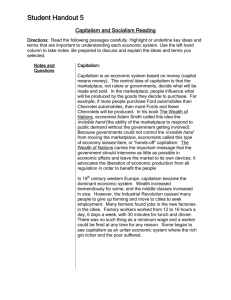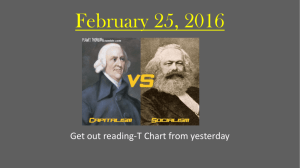Socialism vs. Capitalism Primary
advertisement

Socialism vs. Capitalism Primary Source Analysis Step 1: Background Information Read the background information and socialism and capitalism. Make notes and jot down any questions that you have as you read the information. After reading both passages, answer the questions that follow. Capitalism Capitalism is an economic system based on money (capital means money). The central idea of capitalism is that the marketplace, not rulers or governments, decide what will be made and sold. In the marketplace, people influence what will be produced by the goods they decide to purchase. For example, if more people purchase Ford automobiles than Chevrolet automobiles, then more Fords and fewer Chevrolets will be produced. In his book The Wealth of Nations, economist Adam Smith called this idea the invisible hand (the ability of the marketplace to respond to public demand without the government getting involved). Because governments could not control the invisible hand from moving the marketplace, economists called this type of economy laissez-faire, or “hands-off” capitalism. The Wealth of Nations carries the important message that the government should intervene as little as possible in economic affairs and leave the market to its own devices. It advocates the liberation of economic production from all regulation in order to benefit the people. In 19th century western Europe, capitalism became the dominant economic system. Wealth increased tremendously for some, and the middle classes increased in size. However, the Industrial Revolution caused many people to give up farming and move to cities to seek employment. Many farmers found jobs in the new factories in the cities. Factory workers worked from 12 to 16 hours a day, 6 days a week, with 30 minutes for lunch and dinner. There was no such thing as a minimum wage and a worker could be fired at any time for any reason. Some began to see capitalism as an unfair economic system where the rich got richer and the poor suffered. Socialism Socialism is an economic system in which the government owns and controls manufacturing and is responsible for planning the economy. It was created in an attempt to eliminate the differences between the rich and poor. In a socialist system, where the government owns manufacturing, businesses, and property, the government determines what is to be produced and distributes wealth evenly. Early 19th century socialists believed that the spirit of cooperation evident in socialist theory could replace the marketplace competition of capitalism. Later 19th century proponents of socialist theory, like Karl Marx, believed that cooperation was not possible and that conflict between the owners of capital and those who worked for them in factories was inevitable. He believed that the struggle between the two groups that would eventually lead to a worker’s revolution. Background Information Questions: 1. What role does government play in capitalism? 2. How does the concept of the “invisible hand” support this idea? 3. Why was capitalism viewed as an unfair system in the 19th century? 4. What role does the government play in socialism? 5. What did Marx think would happen in a socialist society? Step 2: Document Analysis Use the Document Analysis Chart to record your thoughts about the primary source documents in this performance task. You will need to use this information to complete your final assignment - so make sure that you write clearly and record complete and accurate responses. Document Document 1: The Pyramid of Capitalist System Are the ideas in this document socialist or capitalist? (Circle one) Socialist OR Capitalist Document 2: Writings from Marx and Engels Socialist OR Capitalist Document 3: Adam Smith, The Wealth of Nations Socialist OR Capitalist Document 4: John Locke, Jean Jacques Rousseau, John Stuart Mill…The Purpose of Government Socialist OR Capitalist Provide evidence from the texts/images and explanations to support your claim (socialist or capitalist?) How would someone from the opposing viewpoint respond to this document? Document 1: The Pyramid of the Capitalist System Document 2: Writings from Marx and Engels Excerpts from the Communist Manifesto by Friederich Engels and Karl Marx, 1848 “The modern bourgeois (middle class) society…has not done away with class antagonisms (hatred between groups of people). It has but established new forms of struggle in place of the old ones. Modern industry has converted the little workshop of the patriarchal (male) master into the great factory of the industrial capitalist. Masses of laborers, crowded into the factory, are organized like soldiers…. They are slaves of the machine and the manufacturer. Instead of rising as industry progresses, they sink deeper and deeper into poverty….” "Owing to the use of machinery and to division of labor, the work of the proletarians (worker class) has lost all individual character, and consequently, all charm for the workmen. He becomes [a limb] of the machine, and it is only the most simple, most monotonous (boring), and most easily acquired knack (skill or ability), that is required of him.” Excerpt from the Principles of Communism by Friedrich Engels, 1847 “Above all, [the government]… will have to take control of industry and of all the branches of production out of the hands of… competing individuals, and instead institute a system as a whole, that is for the common account (good), according to a common plan, and with the participation of all members of society. It will… abolish (eliminate) competition….Private property must therefore be abolished.” Document 3: Excerpts from Adam Smith Excerpts from The Wealth of Nations by Adam Smith, 1776 “The sole purpose of all production is to provide the best possible goods to the consumer at the lowest possible price. Society should assist producers of goods and services only to the extent that assisting them benefits the consumer… he [the consumer] intends his own gain; and he is in this, as in many other cases, led by an invisible hand to promote an end which was no part of his intention…. By pursuing his own interest, he frequently promotes that of the society....” “According to this liberal and generous system, therefore, the most advantageous method in which a landed nation can raise up artificers (craftsmen), manufacturers, and merchants of its own, is to grant the most perfect freedom of trade to artificers, manufacturers and merchants of all nations.” Excerpts from The Theory Of Moral Sentiments, Part VI, Section II, Chapter II, pp. 233-4, para 17. The man of system…is apt to be very wise in his own conceit; and is often so enamoured with the supposed beauty of his own ideal plan of government, that he cannot suffer the smallest deviation from any part of it… He seems to imagine that he can arrange the different members of a great society with as much ease as the hand arranges the different pieces upon a chess-board. He does not consider that in the great chess-board of human society, every single piece has a principle of motion of its own, altogether different from that which the legislature might choose to impress upon it. Use these questions to help you analyze this document (and complete your analysis chart!) 1. In Wealth of Nations, what does Smith see as the role of government? 2. In The Theory of Moral Sentiments, what does Smith see as a problem between government and society? Document 4: The Purpose of Government John Locke "Government being for the preservation of every man's right and property, by preserving him from the violence or injury of others, is for the good of the governed.” (Locke,First Treatise, Chapter 9). Jean-Jacques Rousseau “What, then, is the government? An intermediary body established between the subjects and the sovereign for their mutual communication, a body charged with the execution of the laws and the maintenance of freedom, both civil and political.” (Rousseau, The Social Contract) John Stuart Mill The first element of good government, therefore, being the virtue and intelligence of the human beings composing the community, the most important point of excellence which any form of government can possess is to promote the virtue and intelligence of the people themselves. The first question in respect to any political institutions is, how far they tend to foster in the members of the community the various desirable qualities, moral and intellectual; …. The government which does this the best has every likelihood of being the best in all other respects, since it is on these qualities, so far as they exist in the people, that all possibility of goodness in the practical operations of the government depends. We may consider, then, as one criterion of the goodness of a government, the degree in which it tends to increase the sum of good qualities in the governed, collectively and individually; since, besides that their well-being is the sole object of government, their good qualities supply the moving force which works the machinery. (Mill, Representative Government) Use these questions to help you analyze this document (and complete your analysis chart!) 1. What is the role of government according to John Locke? 2. According to Rousseau, what is the purpose of government? 3. How does Mill support the ideas of Rousseau and Locke? 4. In your opinion, in what areas do these philosophers agree? Step 4: What do you think? ** INDEPENDENT WORK** Directions: Complete the chart below using what you have learned about socialism and capitalism. Use specific evidence from your primary source analysis to support your opinions. Socialism Positives Negatives Capitalism Step 5: Final Writing Assignment **INDEPENDENT WORK** Writing Prompt Pretend that you are in charge for making decisions for the government of your nation. Which economic system, capitalism or socialism, would you choose for your society? Use specific evidence from your primary source analysis to support your argument. Your constructed response must include each of the following: 1) Write an introduction in which you provide the historical background from which capitalism and socialism developed. End the paragraph with a thesis statement (argument) that indicates which economic system you think would be best for your society. 2) Write body paragraphs which describe the characteristics of capitalism and socialism and their respective impact on society. 3) Incorporate quotes and/or evidence from a minimum of two different sources to support your arguments. Explain the meaning of the quotes and/or evidence. 4) Write a conclusion where you discuss the reasons why either capitalism or socialism would be best for your society. Make sure to include specific evidence and explanations to support your thesis statement (argument). Think about including some of the following key terms in your response: capitalism socialism economic system philosophy conflict social labor perspective benefits problems






